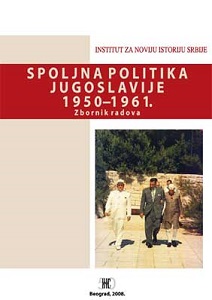Советско-югославские отношения и внутренополитическая ситуaция в венгрии в условиях кризиса 1956 г.
Relations between Yugoslavia and USSR in Case of Internal Crisis in Hungary 1956
Author(s): Aleksandr S. Stikalin
Subject(s): Diplomatic history, Political history, Post-War period (1950 - 1989), History of Communism, Cold-War History
Published by: Institut za noviju istoriju Srbije
Keywords: Imre Nagy; Kádár; Tito; Stalin; USSR; Yugoslavia; Hungary; Hungarian revolution
Summary/Abstract: The rapprochement between the USSR and Yugoslavia after Stalin’s death influenced the relations between Belgrade and all the Soviet satellites. Hungary (as well as Bulgaria and especially Albania) was the case when the normalization of the relations with Yugoslavia went on with considerable difficulties. In a paper based on archival sources the author tries to reveal the reasons of troubles (the role of Rákosi regime in the anti-Yugoslav campaign after 1948 and the distrust of Belgrade to the Hungarian ruling communist elite, the situation with the Yugoslav minorities in Hungary, mutual financial claims and especially the activities of the Yugoslav diplomats in Hungary, their contacts with the inner-party reformist opposition, very active after the 20th Congress of the CPSU). It was Moscow which influenced both sides to meet one another – in spite of the fact that since mid-1956 the Soviet side expressed more anxiety about the attractiveness of the Yugoslav model for East-European communists as the alternative to the Soviet model.
The author assesses the role of the Yugoslav model as an example for Hungarian communist reformers and reveals the complicated reaction of Tito and his team to the Hungarian revolution. The case of the prime minister Imre Nagy, who took refuge in the Yugoslav Embassy in Budapest on 4 November, the day of the Soviet intervention in Hungary, and the new complications in the Soviet-Yugoslav relations after the revolution, as well as the problem of the Hungarian refugees in Yugoslavia since late 1956, provoked new difficulties in the Hungarian-Yugoslav inter-state relations. Most of the Hungarian communist elite (not only radical Stalinists, but the persons from Kádár’s team) looked at the Tito’s regime with mistrust. On the other side, the inconsistent policy of Tito’s regime towards the Hungarian revolution resulted to some extent in the discredit of the Yugoslav model in Hungary among the reformers. Nevertheless, both Belgrade and Budapest wanted to avoid the situation of 1948, tried to normalize the relations between two neighbouring countries equally interested in close economic ties and peace at the frontiers. The support of infl uential Tito and his team was especially important for Kádár in his desire to find a way from isolation. Even the death sentence for Imre Nagy in June 1958 did not affect the relations between Belgrade and Budapest in the long run.
Book: Spoljna politika Jugoslavije 1950-1961.
- Page Range: 139-167
- Page Count: 29
- Publication Year: 2008
- Language: Russian
- Content File-PDF

